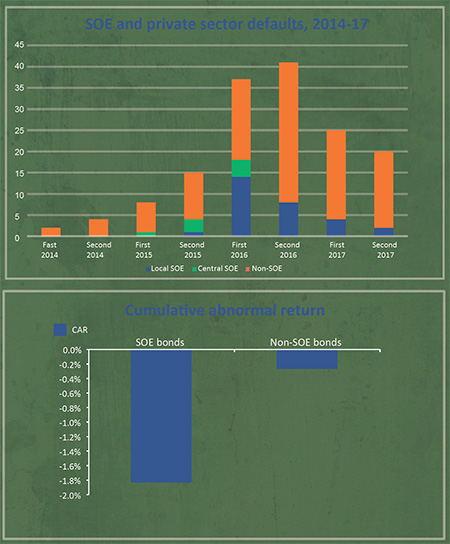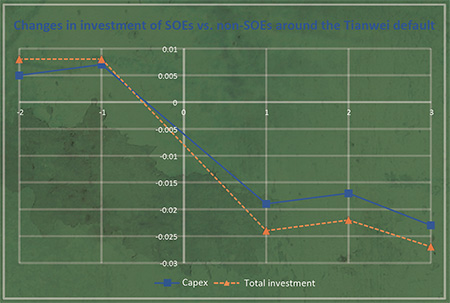Dr Zilong Zhang, Assistant Professor in the Department of Accountancy, looks at the
chequered history of China's state-owned enterprises and how a series of defaults brought a
systemic response and increased financial discipline to the sector. This article is based on "The
Value and Real Effects of Implicit Government Guarantees," by Shuang Jin, Wei Wang, and
Zilong Zhang, May 2017.
State-owned enterprises (SOEs) are
systematically important in China's
economy, helping to create and
maintain millions of jobs, as well
as support strategically important
industries. Historically, publicly-listed
SOEs have contributed up to
85% of the total sales of all listed
companies in China1, and were
widely seen as being "too big to
fail." But behind the impressive
statistics opinion remained divided
on the efficiency of the state-owned
sector. In the early 2010s
sentiment began to change. At the
fourth meeting of the US-China
Strategic and Economic Dialogue
(S&ED) in May 2012, China
committed to "developing a market
environment of fair competition for
enterprises of all kinds of ownership
and to providing non-discriminatory
treatment for enterprises of all
kinds of ownership in terms of
credit provision, taxation incentives,
and regulatory policies." The winds
of change seemed to be gathering
force over the SOE sector. Was
accountability now to be the name
of the game?
Investors cling to the old
belief in implicit government
guarantees
Initially, investors were not too
bothered. They clung to the belief
that SOEs were simply "too big to
fail." When these often gigantic
companies were in danger of
default, the government had always
somehow found a way to bail
them out. After all, back in 1997,
when Jiangxi Radio Factory was on
the verge of bankruptcy, the local
government had invited Tsinghua
Tongfang, a software company
based in Beijing, to acquire the
factory and inject capital into the
merged firm. The government
provided policy support for the
merger and the debt repayment.
Again, in 2008, the central
government – in the form of the
State-owned Assets Supervision and
Administration Commission – had
directly subsidised five state-owned
electricity companies that were
deeply distressed. The subsidies
shared by the five companies
amounted to a then massive USD
1.8 billion in total.
Such "implicit government
guarantees" created a safe harbour
not only for SOEs' bond investors, but also for their managers. In
anticipation of a government
guarantee, managers tended to
borrow excessively and overinvest
in inefficient projects without
worrying too much about the
consequences. Such implicit
government guarantees were
criticised as an important cause
for the high financial leverage of
SOEs' overcapacity and inefficient
production.
The unprecedented credit boom of
the early 2010s further aggravated
the overleverage and overcapacity
problems. According to the China
Stock Market & Accounting
Research (CSMAR) database, during
2011-2015, the financial leverage
of SOEs averaged 54% while the
average return on assets of SOEs
was only 3.3%. The corresponding
numbers for non-SOEs, however,
were a rather more financially
competitive 39% and 5.7%. To
deal with these problems, Chinese
regulators encouraged firms to deleverage
and called for the cutting
of inefficient production. A series
of non-bailout events were to
follow, reflecting the government's
declining tolerance for non-performing
firms and its attempt to
allow market forces to play a more
decisive role in restructuring the
economy.
The average cumulative abnormal return of SOE bonds during a 60-day window
around the Tianwei default
"The first-ever SOE
default symbolised the
end of an era.
The implicit guarantee
had fallen through the
trapdoor of history"
The historic default of Baoding
Tianwei
The first major shockwave to hit
was on 21 April 2015. Baoding
Tianwei, a manufacturer of power
transmission and distribution
equipment including the
strategically important photovoltaic
and wind power sectors based in
Hebei province, defaulted on one
of its onshore bonds. Tianwei was
a wholly-owned subsidiary of China
South Industries Group, an SOE
ranked 102nd in the Fortune Global
500 in 2016. This was the first-ever
SOE default in the entire history
of Chinese onshore bond market,
and it came to symbolise the end of an era. The implicit guarantee
had fallen through the trapdoor of
history.
A series of SOE defaults followed
in quick succession. In July
2015, Jilin Grain Group, a grain
producing enterprise owned by
the Jilin government, defaulted
on its private placement bonds. In
September, China National Erzhong
Group, a heavy machinery company
owned by the central government
and located in Sichuan Province,
defaulted on a medium-term note
issued in 2012. In October, Sinosteel
Corporation, a mineral processing
and steelmaking company owned by the central government and
headquartered in Beijing, failed to
pay interest due on 2 billion CNY
notes maturing in 2017. And in
December, Tianwei defaulted again,
this time on one of its private
placement notes. The wave of SOE
bond defaults continued in the
following couple of years. In the
aftermath of the Tianwei default,
Moody's stated, "Recent episodes
of SOE distress show that regional
and local governments' autonomy
to provide direct financial support
to struggling SOEs is diminishing
as a result of restrictive central
government regulations."2
The retreat of the government's
guarantee came as a shock to the
corporate bond market. Investors
reacted by bidding down the price
of SOE bonds. Using the data
provided by CSMAR and WIND, we
have calculated that the average
cumulative abnormal return (CAR)
of SOE bonds was 1.53% lower
than that of non-SOE bonds during
a 60-day window around the
Tianwei default.
The behaviour of SOE managers
begins to change
Now the SOE managers faced a
real threat of corporate failure.
Would the threat discipline the
managers and discourage them
from making bad investment
decisions? We answered this
question by conducting regression
analyses using a large sample of
SOEs and non-SOEs from January
2013 to December 2016. We
first matched SOEs and non-SOEs
based on various financial metrics
and then examined the change in
the SOEs' investment record from
before to after the Tianwei default
relative to the change of non-SOEs'
investment in the same period.
We found that SOEs cut their
investment by 1.9% of book assets
relative to non-SOEs in the first
semiannual period after the Tianwei
default. We further split our sample
into different groups according
to manager characteristics and
performed an analysis for each
group. Interestingly, we found
that the investment reduction was mainly made by bad managers
(characterised as those managers
with above median misconducts
or lawsuits recorded against them
before the Tianwei default). Finally,
we found that SOEs managers
made better acquisitions after the
Tianwei default, as evidenced by a
better stock price reaction to their
acquisition announcements. SOE
acquirers' abnormal stock returns
outperformed non-SOE acquirers'
by 2.4% in the 5-day window
around acquisitions.
The advent of financial
discipline
Overall, our findings suggest that
the reduction of implicit government
guarantees, or the disappearance
of "too big to fail," disciplined
corporate managers. This finding not
only confirms theoretical predictions
by academia, but also has important
policy implications – allowing the
market mechanism to play its role
in restructuring troubled SOEs has a
positive effect on the real sector in
the long-run, even though it may bite
current bondholders.
"Too big to fail" is not a
phenomenon exclusive to China.
The experience of GM and Chrysler
during the 2008-2009 financial
crisis highlights the prevalence of US
government support in bailing out
systemically important corporations
during severe economic downturns.
Other real-sector firms that have
been bailed out by their home
governments include Groupe Bull
SA (France), Norilsk Nickel (Russia),
Bangkok Land (Thailand), Malaysian
Airline System (Malaysia), Railtrack
(UK), etc. In this sense, the effect
we document can travel around the
world.
References:

Dr Zilong Zhang
Assistant Professor
Department of Accountancy




